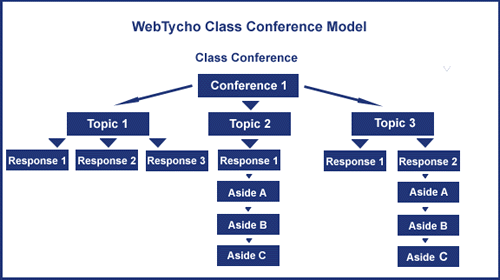WebTycho Model
Author: Dr. Claudine SchWeber
Overview of the WebTycho Model
| INTERACTIVE | NON-INTERACTIVE | |
| PUBLIC |
|
|
| PRIVATE |
|
Interactive and Non-Interactive Domains
UMUC's WebTycho offers the instructor
the opportunity to use two critical features: the "Interactive" --Conferences--
area; and the "Non-Interactive"--Course Content--area. That is,
the Conference area, in particular, allows you and the students
to regularly interact about the ideas or topics; the Course content
area is a "read only" feature, in which communication is one-way, from
the instructor to the students, and is used to deliver information, data,
notes, etc. without feedback. [note: other interactive areas are assignments,
email and study group activities; additional non-interactive items are
the announcements section and the reserved readings.]
As you plan your Web course,
you should consider how to take advantage of these online benefits. For
example, you might use the Course content area for the following:
mini-lectures organized on a weekly basis; assignments; Web resources.
You might use the Conference area to: introduce yourself and the
class; to put up a conference called "mini-lectures" with topics for each
week's presentation and student responses; to have the entire class read
and respond to projects done by the study groups; to have a discussion
about individual or group presentations.
|
|
|
|
|
|
|
|
|
|
|
|
|
The Public and Private Environments
In fostering a learning environment,
UMUC's WebTycho allows for both public and private communications.
In the public arena are those which are open to everyone in the
class: syllabus, faculty information area, conferences, items in Course
Content area, roster, reserve readings, and announcements; in the private
arena are those functions which are available only to an individual
or a designated group of students, such as: individual e-mail, student
assignments, and study groups [note: faculty have access to all student
assignments and study groups]. Understanding these differences allows the
faculty member to balance student learning which is shared among class
members and that which fosters individual growth and development.
The important point about these two aspects of the Web is that online courses cannot be directly transported from their traditional face-to-face formats; instead Web courses must be modified to take advantage of the interactive capabilities of this technology.
|
|
|
|
|
|
|
|
|
|
|
|
|
|
WebTycho Conferences
The conference area is the
"heart" of GSMT's WebTycho classroom. In the conference, faculty
can foster a high level of interactivity among participants.
